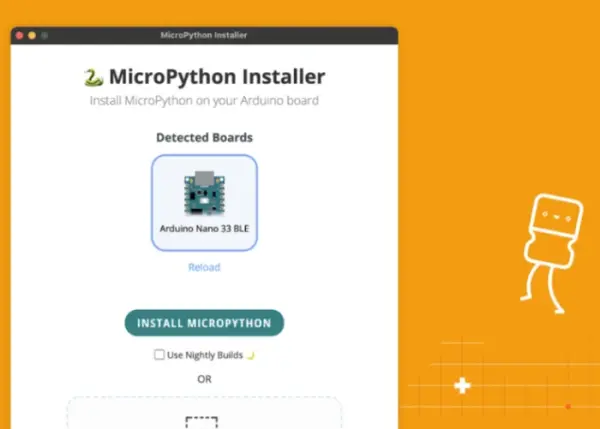The passionate development team at Arduino has always been committed to empowering developers, and in this mission, they have unveiled their latest tools when using Arduino and MicroPython. Aimed at developers who use Arduino boards and third-party ones, these tools have been released under the umbrella of Arduino Labs, with an ‘experimental’ tag that alludes to the innovative spirit of the developers.

The Arduino Lab Editor for MicroPython and its associated tools are a step towards making development easier and more accessible. Whether you are a novice programmer or an experienced developer, these tools aim to simplify your journey with MicroPython on Arduino.
To ease the process of flashing the MicroPython firmware image on Arduino boards, the Arduino Lab Installer for MicroPython has been introduced. This tool reduces the technical hurdles and streamlines the process, enabling developers to utilize MicroPython more efficiently.
Arduino Lab Editor for MicroPython
The Arduino Lab Editor for MicroPython Version 0.8 is now available and within this new release, there’s a lot to look forward to:
- An enhanced user interface for more intuitive navigation
- A superior file management system that now supports subfolders
- Highly stable file-system operations for a seamless save, upload, download, and run processes
- An easy-to-manage library and modules, nestled in the ‘lib’ folder, maintaining a cleaner board storage
The new features help reduce development time, allowing users to focus more on their core tasks and less on operational issues. In its endeavor to further support developers, Arduino has created an initial list of MicroPython packages, beneficial for learning and experimenting with this language. Aptly named as Arduino MicroPython Package Index, this list promises to be a valuable resource for Arduino developers.
As they explored existing packages, the team identified that several were available but did not always align with the latest MicroPython versions or certain target hardware. To address this, Arduino decided to maintain a curated list of useful packages. These packages are tested for compatibility with Arduino boards and with updated versions of official MicroPython.
The good news doesn’t stop there. The development team is also planning to release tools to easily search, download, and install from this package index in the future. This will enhance the user experience, making package management an effortless task.
Contribution to Arduino MicroPython Package Index
Embodying the spirit of open-source collaboration, Arduino has opened the doors for anyone to contribute to the Arduino MicroPython Package Index. If you want to propose a package to be added, you simply have to follow the contribution guidelines published in the repository.
The improved UI, better file management, the curated Arduino MicroPython Package Index, and the upcoming tools for easy package management promise to take the development experience to a new level. Indeed, Arduino’s ongoing commitment to improvement and user empowerment remains at the heart of these new tool releases.
For more information on the Arduino Lab Editor for MicroPython jump over to the official Arduino website.
What is MicroPython
MicroPython is a lean and efficient implementation of the Python 3 programming language. It’s designed to be compatible with constrained environments and embedded systems, such as microcontrollers.
The main idea behind MicroPython is that it allows you to write Python scripts that interact directly with hardware, providing a high-level and easy-to-use language for embedded systems programming. It was developed from scratch to incorporate all the Python 3.4 standard libraries, aiming to be as close as possible to standard Python to allow programmers to transfer their knowledge seamlessly from traditional computers to microcontrollers.
Despite its compact nature, MicroPython still retains a comprehensive range of features from Python, including exceptions, modules, classes, closures, list comprehension, generators, and more. Also, it includes a subset of Python standard libraries and is optimized to run on microcontrollers, small embedded systems, and other systems with limited resources.
One of the key features of MicroPython is the interactive REPL (Read-Eval-Print Loop) that allows developers to connect to the board and execute commands directly, speeding up the development process. This also enables real-time debugging and development, enhancing the overall experience for developers.
MicroPython has been embraced by the maker community and has seen adoption in a variety of settings, from hobbyist projects to industrial applications. Its ability to run on minimal hardware and easy integration with sensors and actuators make it an attractive choice for IoT (Internet of Things) projects.
Source: New Arduino Lab Editor features for MicroPython
